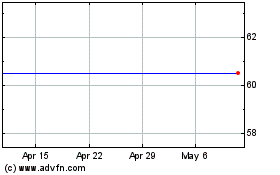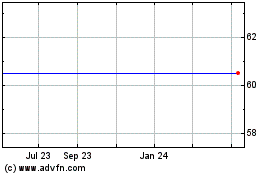CIO Survey Shows Key Drivers Behind Adoption of IP Communications
July 16 2007 - 9:00AM
Business Wire
A recent IDG Research Services survey of CIOs from across the U.S.
shows strong and increasing adoption of IP telephony. The survey
also details the business imperatives driving this adoption,
including factors such as the need for greater access to advanced
telephony applications, improved management of distributed
operations, and reduced costs. Core findings from the survey showed
that a full 63 percent of respondents plan to deploy an IP PBX
within the next 12 months, up from 50 percent who have the
technology deployed in some form today. �The good news is that IP
telephony has a great deal to offer the enterprise, and CIOs are
seeing the tangible benefits of this technology,� said Joseph A.
Staples, senior vice president of worldwide marketing for
Interactive Intelligence Inc. (NASDAQ:ININ), a global developer of
business communications software specializing in voice over IP and
the primary sponsor of the study. �However, I think it�s critical
that CIOs understand an IP PBX deployment doesn�t automatically
translate into greater flexibility and reduced costs. Many IP PBXs
today, are, in fact, still hardware-centric and built largely on
proprietary standards.� In order to ensure maximum value from an IP
PBX, Staples advises CIOs to press hard on potential vendors about
things like a single interface for administration, security
architecture, adoption of the open SIP standard, breadth of
applications, and integration with back-office systems. Though the
survey results showed increasing adoption of IP telephony,
respondents� expressed some concerns as well, with network
readiness (44 percent) and reliability (43 percent) chief among
them. �I�m actually glad to see that network readiness and
reliability are top-of-mind for CIOs,� Staples said. �These
concerns are extremely valid, but thankfully, they can largely be
addressed by applying vendor selection criteria based on extensive
IP telephony customer references and demonstrated expertise in
network readiness assessments.� Adding to this guidance, one survey
respondent said that �CIOs mustn�t fall into the trap of going with
the least expensive vendor or the most recognizable brand name.�
�Many traditional telephony, networking and even data vendors are
now offering some form of IP PBX,� Staples said. �CIOs shouldn�t
assume that big-name vendors with established roots in related
markets are also experienced in providing sophisticated IP-based
communications applications. This is an extremely important
distinction when you consider that today it�s the enhanced
applications that are driving the real value of IP PBXs.� Also of
note are survey findings that indicate performance (74 percent) and
security (63 percent) are the most important criteria when
selecting an IP communications solution. �It�s critical for
businesses to probe vendors about security features, such as their
ability to encrypt both recorded and live calls, and their systems�
ability to handle communications between secure and non-secure
devices,� Staples said. �These types of questions have major
implications for not just security, but cost and performance as
well.� The most popular voice over IP-enabled applications
according to respondents, were unified messaging, speech
recognition, videoconferencing, mobility, and teleworking. In
particular, unified messaging showed the most significant potential
for growth, with 30 percent of respondents indicating they already
had the application in use, but an additional 49 percent saying
they have plans to deploy it within the next 12 months. �These
survey results show that unified messaging may finally be hitting
its stride,� Staples said. �However, given that 46 percent of
respondents also plan to deploy �unified communications,� it�s very
likely that UM will be cost-justified as part of a more
comprehensive UC solution purchase, which would include other
productivity-enhancing applications, such as presence management
and call follow-me/find-me.� The IDG Research Services survey was
administered via e-mail to its CIO database of IT and corporate
managers at U.S. companies with more than 100 employees. IDG
Research received 105 responses to its 15-question survey. The
respondents� average company size was 14,000 employees. To download
the complete survey results, including respondent commentary, visit
http://www.cio.com/whitepapers/inin. About Interactive Intelligence
Interactive Intelligence Inc. (NASDAQ:ININ) is a global provider of
business communications software and services for contact center
automation and enterprise IP telephony. The company was founded in
1994 and has more than 2,500 customers worldwide. Recent awards
include the 2006 Network World 200, CRM Magazine�s 2006 Rising Star
Excellence Award, Network Computing Magazine�s 2006 Well-Connected
Award, and Software Magazine�s 2006 Top 500 Global Software and
Services Companies. Interactive Intelligence employs approximately
525 people and is headquartered in Indianapolis, Indiana. The
company has five global corporate offices, with additional sales
offices throughout North America, Europe and Asia Pacific.
Interactive Intelligence can be reached at +1 317.872.3000 or
info@inin.com; on the Net: http://www.inin.com. This release
contains certain forward-looking statements that involve a number
of risks and uncertainties. Factors that could cause actual results
to differ materially are described in the company's SEC filings.
Interactive Intelligence Inc. is the owner of the marks INTERACTIVE
INTELLIGENCE, its associated LOGO and numerous other marks. All
other trademarks mentioned in this document are the property of
their respective owners.
Interactive Intelligence Grp., Inc. (NASDAQ:ININ)
Historical Stock Chart
From Sep 2024 to Oct 2024

Interactive Intelligence Grp., Inc. (NASDAQ:ININ)
Historical Stock Chart
From Oct 2023 to Oct 2024
